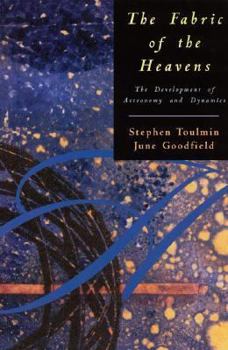The Fabric of the Heavens: The Development of Astronomy and Dynamics
Select Format
Select Condition 
Book Overview
Conceived as three companion volumes that form an introduction to the central ideas of the modern natural sciences, these books--intelligent, informative, and accessible--are an excellent source for those who have no technical knowledge of the subject. Praise for The Fabric of the Heavens: "I cannot remember when I last went through a book, any book, with such all-devouring zest. What is more, even the most complex technicalities...
Format:Paperback
Language:English
ISBN:0226808483
ISBN13:9780226808482
Release Date:November 1999
Publisher:University of Chicago Press
Length:294 Pages
Weight:0.90 lbs.
Dimensions:0.6" x 6.0" x 9.0"
Customer Reviews
2 ratings
Describing the Fabric of the Heavens in Space & Time
Published by Thriftbooks.com User , 18 years ago
Astro' Thinking: The story of our relationship with the stars and their celestial kins is ancient, fascinating, and full of awe. Stephen Toulmin and June Goodfield, outline the history of celestial thinking from Egyptian and Babylonian times to the Newtonian Copernician revolution that erupted into our visualization of the Y2K space. The lives and works of Aristotle, Philoponus, Copernicus, Galileo, and Newton are duely explored, linking them into a geometric progression. Planetary Dynamics: "All of planetary dynamics was a mess until Copernicus showed up, right? Sweeping away all Ptolmey's epicycles and deferents, he single-handedly gave birth to the modern conception of a Sun-centered planetary system. Right? Well, not exactly. Unfortunately, the history of astronomy didn't proceed along such a simple path. Until Kepler, Sun-centered calculations provided no better fit to observational data than Earth-centered models. Copernicus's revolution in fact required decades to gain momentum, and the first standard-bearers favored only his mathematics over the older systems." Ryan Wyatt The Fabric of the Heavens: This was a first volume in a four-volume series, The Ancestry of Science: an introduction to the development of astronomy and its dynamics. Published in 1962, The Fabric of the Heavens was one of the first modern studies of the development of physical science; is accessible, informative, and an excellent basis for novice science readers. The writers explore the contribution of the sciences to early cosmological thinking. Concentrating on the background of ancient science, ranging from the beginnings of celestial forecasting in Sumeria to the influences of Newton's thought on an evolving science. The scientific writers use a compelling, and precise language to trace the history of ideas that made today's science. They develop the main concepts in philosophy of science, present science as an intellectual process that changed philosophy and promoted philosophy, surveying noteworthy philosophical accounts of the scientific enterprise,the nature of theories, and the growth of scientific knowledge. Appreciating the 'Fabric': "The discipline is admirably suited to the authors' task, and cunningly devised for the reader's edification and, indeed, for his delight." Physics Today "I cannot remember when I last went through a book, with such all-devouring zest. ... The Fabric of the Heavens is, in every sense of the word, an eye-opener." The Yorkshire Post Stephen Toulmin: A British philosopher, and science historian, born in 1922, was influenced by Ludwig Wittgenstein, at Cambridge University. He was Professor at University of Southern California, was known for seminal work in modeling arguments and developing the case for the Return to Reason, vs. Rationality. He is the author of some twenty books, in those domains.
amazing
Published by Thriftbooks.com User , 23 years ago
"The Fabric of the Heavens" is the first in a series of three books, written in the 1960s, that attempt to outline the development of modern scientific thought. This first book deals with astronomy and dynamics, and the union of those two disciplines that created our modern ideas of the universe, forces, motion, etc.Toulmin and Goodfield begin in ancient Babylon, where highly accurate mathematical techniques were used to calculate the positions of heavenly bodies. They move through several periods of Greek thought, through the medieval period and the flourishing of Islamic scholarship, on through the Renaissance, up to Newton, past Einstein, and on to the middle of the twentieth century. They are careful to show how and why past astronomers and natural philosophers asked the questions they did, why things that today appear to be common sense were inconceivable in the past, and why obviously brilliant people explained the world in ways we now see as misguided."The Fabric of the Heavens" is an amazing book, especially because of Toulmin and Goodfield's ability to make complex ideas clear to those of us who aren't physicists or astronomers. I was, however, somewhat dissatisfied near the end. Toulmin and Goodfield, while skilled at explaining the distant past, seem a bit slapdash describing the first half of the twentieth century, and, of course, do not describe the second half at all. The book also has a highly Western focus, probably because cosmological ideas in other parts of the world did not directly affect the development of modern science.Nevertheless, "The Fabric of the Heavens" is fascinating, well-written, and enjoyable. I highly recommend it.





